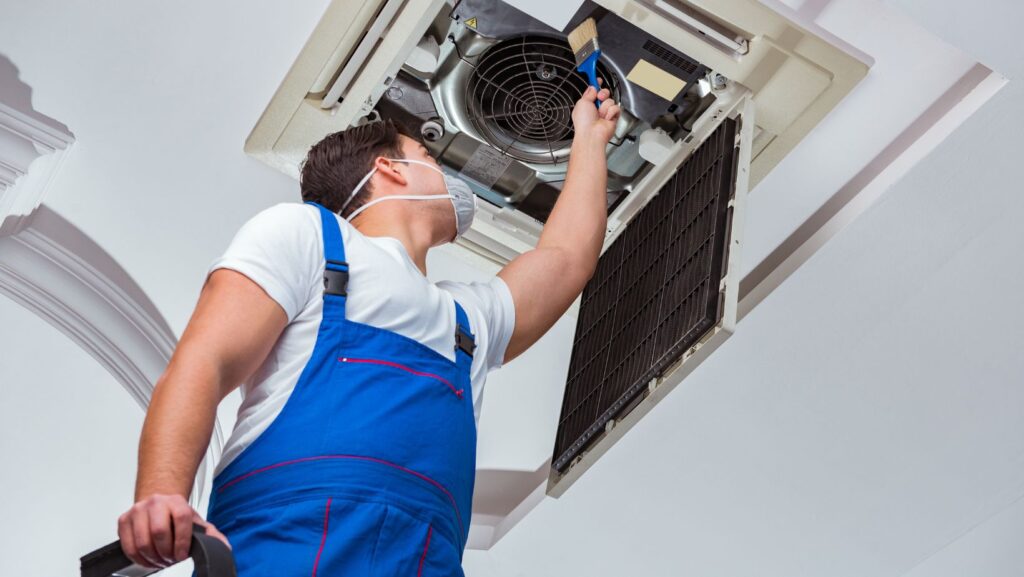Your HVAC (Heating, Ventilation, and Air Conditioning) system is the workhorse that keeps your home comfortable throughout the year. However, moisture and dust are two persistent culprits that can significantly impact the efficiency and longevity of your HVAC system. If not managed properly, they can lead to issues such as mould growth, poor air quality, increased energy consumption, and costly repairs. Fortunately, with a bit of knowledge and regular maintenance, you can avoid these common problems and keep your HVAC system running smoothly.
1. The Role of Condensate Pumps
One of the primary ways your HVAC system handles moisture is through the use of condensate pumps. When your air conditioner cools the air, it pulls moisture from the air, which then condenses on the evaporator coils. This moisture needs to be drained away effectively to prevent water buildup, which can lead to leaks, mould, and damage to your system. Condensate pumps are designed to remove the accumulated water and direct it outside the home or into a designated drain.
However, if a condensate pump becomes clogged or fails, the result can be water leaks, which may damage the surrounding structure or lead to mould growth. Therefore, regular checks and maintenance of the condensate pump are crucial to ensure it’s working correctly. It’s also wise to inspect the condensate drain line periodically to ensure it’s not blocked by debris or algae.
2. Regularly Replace Air Filters
Air filters are your HVAC system’s first line of defence against dust and other airborne particles. If the filters are not changed regularly, they can become clogged and reduce the system’s efficiency. Clogged filters restrict airflow, causing your HVAC system to work harder to maintain the desired temperature. This increased strain not only raises your energy bills but also leads to wear and tear on critical components like the blower motor and evaporator coils.
Ideally, air filters should be checked every month and replaced every one to three months, depending on your system and home conditions. Homes with pets, smokers, or residents with allergies should consider changing filters more frequently to maintain clean air and prevent dust buildup.
3. Keep Your HVAC System and Ductwork Clean
Dust is one of the most common causes of reduced HVAC efficiency. Over time, dust and dirt can accumulate in your system’s ductwork and components, leading to poor air circulation and reduced efficiency. This not only puts extra strain on your system but also affects indoor air quality, potentially causing respiratory issues for the occupants.
Having your ductwork professionally cleaned every three to five years can significantly improve air quality and system efficiency. If you live in a particularly dusty area or have recently completed renovations, it might be worth cleaning your ducts more frequently. Additionally, cleaning and inspecting components like the blower motor, evaporator coils, and registers can help prevent dust from circulating through your home.
4. Control Humidity Levels
High humidity levels can create excess moisture within your HVAC system, increasing the risk of mould and mildew growth. Mould can not only damage your HVAC system but also negatively impact indoor air quality and pose health risks to the occupants. Ideally, your home’s humidity level should be between 30% and 50%.

Using a dehumidifier in conjunction with your HVAC system can help maintain optimal humidity levels, especially in areas with high humidity. Many modern HVAC systems also come with built-in dehumidification features to automatically adjust moisture levels. Regularly monitoring and maintaining the correct humidity in your home is essential to prevent moisture-related issues.
5. Inspect and Maintain the Outdoor Unit
The outdoor unit of your HVAC system is exposed to various environmental elements, such as dust, debris, and foliage. If not properly maintained, these elements can obstruct airflow and reduce the system’s efficiency. Over time, this can lead to overheating, increased energy consumption, and even compressor failure.
Make it a habit to inspect the outdoor unit regularly and clear away any leaves, grass, or dirt that may have accumulated around it. Ideally, the area around the unit should have at least half a metre of clearance on all sides to allow for proper airflow. You should also clean the unit’s fins gently with a hose to remove dust and debris, but be careful not to bend or damage them.
6. Seal and Insulate Ductwork
Leaky ductwork can contribute to moisture issues by allowing unconditioned air from crawl spaces or attics to enter your HVAC system. This unconditioned air often carries moisture, dust, and other contaminants, leading to reduced efficiency and increased strain on your system. Additionally, leaky ducts can result in significant energy losses, raising your utility bills.
To prevent these problems, have your ductwork professionally inspected and sealed if necessary. Insulating the ducts in unconditioned spaces, such as basements and attics, can also help reduce moisture buildup and energy loss. Properly sealed and insulated ductwork ensures that conditioned air reaches all parts of your home efficiently and without contamination.
7. Keep Vents and Registers Clean and Clear
Vents and registers are responsible for distributing conditioned air throughout your home. If they become obstructed or dirty, it can lead to poor air circulation and uneven cooling or heating. Over time, dust and dirt can build up in the registers, reducing airflow and increasing the likelihood of dust spreading throughout your home.
Regularly vacuuming and wiping down vents and registers can help maintain clean airflow and prevent dust accumulation. Additionally, avoid placing furniture or other objects in front of vents, as this can obstruct airflow and reduce the system’s efficiency.
8. Schedule Regular Professional Maintenance
While there are many steps you can take to prevent moisture and dust issues on your own, scheduling regular professional maintenance is crucial for keeping your HVAC system in top condition. A professional technician will conduct a thorough inspection, clean critical components, and identify potential issues before they escalate into costly repairs.
During maintenance, the technician will inspect and clean components such as the evaporator and condenser coils, the blower motor, and the condensate pump. They will also check refrigerant levels, electrical connections, and overall system performance. By catching small issues early, regular maintenance can extend the life of your HVAC system and prevent unexpected breakdowns.
9. Consider Installing a Whole-Home Air Purifier
If dust and allergens are a persistent issue in your home, you might want to consider installing a whole-home air purifier. These systems work in conjunction with your HVAC system to remove dust, allergens, and other pollutants from the air. By improving indoor air quality, air purifiers can reduce the amount of dust that accumulates within your HVAC system, thereby extending its lifespan and enhancing efficiency.

Some air purifiers also include UV-C light technology, which helps eliminate mould spores and bacteria that could otherwise accumulate in the system. This can be particularly beneficial if you or your family members suffer from allergies or respiratory conditions.
10. Understand When It’s Time for an Upgrade
If your HVAC system is outdated or frequently experiencing moisture and dust issues despite regular maintenance, it may be time to consider an upgrade. Newer HVAC systems are designed with advanced filtration and moisture management features, making them more efficient and effective at preventing these common problems.
When upgrading, consult with a professional to determine the best system for your home’s needs and size. A properly sized and efficient system will provide better airflow, moisture control, and dust filtration, ultimately saving you money on repairs and energy bills.
Moisture and dust are two of the most common issues that can compromise the efficiency and longevity of your HVAC system. By taking proactive measures such as maintaining condensate pumps, regularly replacing air filters, and scheduling professional inspections, you can avoid these common problems and keep your system running smoothly. Remember, a little effort in maintenance and care today can save you from costly repairs and poor air quality down the road.
With these tips, you’ll be well on your way to enjoying a comfortable, healthy, and efficient home environment, no matter the season. So, stay proactive, keep an eye on your HVAC system, and breathe easy knowing that you’re taking the necessary steps to prevent moisture and dust from causing havoc.



